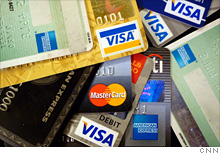
Even if you think you have good credit, even if you get a “preapproved” credit card offer in the mail, you can still be shot down when you apply for a credit card. What gives?
Credit experts say there are a few obvious reasons — like blowing off bills regularly or having a recent bankruptcy — that can get you denied. There are also some more surprising reasons why you might have trouble getting a credit card.
You don’t have enough credit. Some people pat themselves on the back for having only a single credit card, or none at all. No credit cards or other obligations like mortgages or car loans, may mean you’re just frugal and really good with your money. But it makes you a cipher to credit card companies. “Lenders prefer being able to review a track record of how a person has managed credit in the past,” the National Foundation for Credit Counseling says. Without that, there’s a good chance they might not gamble on the unknown.
You’re going too fast. “It’s a red flag if a person is attempting to obtain too much credit at one time,” the NFCC says. Yes, this might seem counter to the idea that you need to build up your credit to get more credit. The key, though, is to build that credit history slowly. If an issuer sees that you just got a few new credit cards, they might wonder if you’re going to be able to handle one more.
You fell for that “preapproval” pitch. All that junk mail you get that says you’re preapproved doesn’t mean a thing, says Gerri Detweiler, director of consumer education at Credit.com. “Those offers are prescreened, but when consumers respond, an actual, full screening will take place,” she says. That more extensive look at your finances could catch a red flag the system’s earlier, less in-depth review missed.
You follow the 30% rule. The conventional wisdom is that you should keep your credit utilization ratio — that is, how much credit you have outstanding as a percentage of your credit limit — to 30% or lower. In reality, even a reasonable-sounding 30% might be too high for some skittish lenders. “The lower the utilization ratio the better,” says Curtis Arnold, founder of CardRatings.com. The amount of debt you have makes up 30% of your FICO credit score, so too much outstanding debt compared to your limit (that’s both per card and in the aggregate, FYI) can turn off a lender.
You’re double-dipping. “If you are trying to take advantage of the same bonus offer you already nabbed, your application may be denied,” Detweiler says. On a related note, if you already have multiple cards from the same issuer, you may not be approved for another one, Arnold says, especially if you’re trying to hit up the same bank for a balance transfer deal.
Somebody else messed up. Mistakes happen, and one on your credit report can keep you from getting a card, says Odysseas Papadimitriou, CEO and founder of Evolution Finance. Go to annualcreditreport.com to see your credit report for free. Don’t fall for similar-sounding sites; they might be trying to sell you an expensive credit-monitoring subscription. Go through the report and, if you find a mistake, Papadimitriou says sites like CardHub.com (which his company owns) offer guides for how to dispute credit report errors.
More Must-Reads From TIME
- The 100 Most Influential People of 2024
- The Revolution of Yulia Navalnaya
- 6 Compliments That Land Every Time
- What's the Deal With the Bitcoin Halving?
- If You're Dating Right Now , You're Brave: Column
- The AI That Could Heal a Divided Internet
- Fallout Is a Brilliant Model for the Future of Video Game Adaptations
- Want Weekly Recs on What to Watch, Read, and More? Sign Up for Worth Your Time
Contact us at letters@time.com